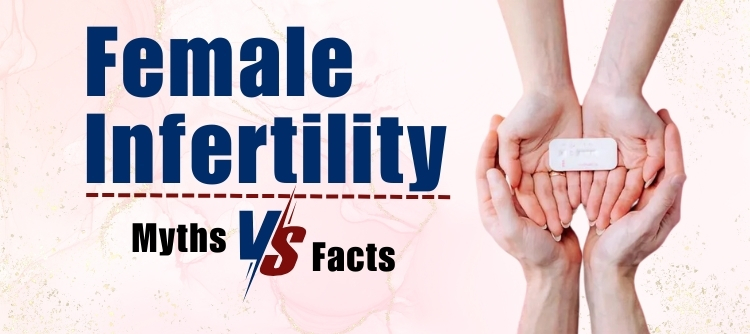Female Infertility Myths vs. Facts

Female infertility is a complex subject that has been surrounded by myths and misconceptions for centuries. These false beliefs not only mislead individuals but can also delay proper diagnosis and treatment. Understanding the facts about female infertility is crucial for women and couples seeking clarity and effective care. At Nishant Fertility Centre, we aim to debunk common myths and provide accurate information to empower women on their fertility journey.
Myth 1: Infertility Is Always the Woman’s Fault
Fact: Infertility Affects Both Men and Women Equally
One of the most common myths is that infertility is always linked to the woman. However, research shows that infertility is equally likely to be caused by male factors, female factors, or a combination of both. In approximately 40–50% of cases, male factors contribute to infertility.

Myth 2: Infertility Means You Can Never Have Children
Fact: Infertility Does Not Always Equal Sterility
Infertility does not mean a woman cannot conceive; it simply means there may be challenges in achieving pregnancy naturally. With advancements in medical science, treatments like ovulation induction, intrauterine insemination (IUI), and in-vitro fertilization (IVF) can help overcome infertility challenges.
Myth 3: Age Does Not Affect Female Fertility
Fact: Fertility Declines With Age
It is a widespread misconception that women can conceive at any age without difficulty. In reality, a woman’s fertility starts to decline significantly after the age of 35 due to a decrease in both the quality and quantity of eggs. Early testing and intervention can improve the chances of conception.
Myth 4: Stress Is the Main Cause of Infertility
Fact: Stress Alone Rarely Causes Infertility
Although stress can have an impact on general health, infertility is rarely caused by stress alone. Infertility is more commonly associated with underlying medical conditions such as polycystic ovary syndrome (PCOS), endometriosis, blocked fallopian tubes, or hormonal imbalances.

Myth 5: Lifestyle Choices Have No Impact on Fertility
Fact: Lifestyle Plays a Significant Role in Fertility
Lifestyle choices, including diet, exercise, and substance use, can significantly impact fertility. Smoking, excessive alcohol consumption, being overweight, or being underweight are known to affect a woman’s ability to conceive.
Fertility Diet to Improve Fertility in Women
Myth 6: A Woman’s Menstrual Cycle Does Not Affect Fertility
Fact: Irregular Menstrual Cycles Can Be a Sign of Infertility
Irregular periods are often a sign of ovulation disorders, which are a leading cause of female infertility. Women with irregular cycles may face difficulty conceiving as ovulation becomes unpredictable.
If you experience irregular periods, consulting a female infertility treatment in Jaipur can help identify the cause and provide solutions to regulate your cycle and improve your chances of conception.
Myth 7: Fertility Treatments Are Only for Younger Women
Fact: Fertility Treatments Can Help Women of All Ages
While age is a critical factor in natural conception, fertility treatments can assist women of various age groups in achieving pregnancy. Techniques like IVF, egg freezing, and donor eggs can provide solutions for women facing age-related infertility challenges.
Myth 8: Once You Have One Child, You Cannot Face Infertility
Fact: Secondary Infertility Is Real
Secondary infertility refers to difficulty conceiving after having one or more successful pregnancies. It can occur due to age, lifestyle changes, medical conditions, or complications from previous pregnancies.
Myth 9: Herbal Remedies Can Cure Infertility
Fact: Evidence-Based Medical Treatments Are More Effective
Although herbal remedies and traditional treatments are often touted as cures for infertility, there is limited scientific evidence to support their effectiveness. In contrast, modern medical treatments are backed by extensive research and proven results.
Myth 10: Fertility Treatments Are Always Expensive
Fact: Affordable Options Are Available
While some fertility treatments, like IVF, can be costly, not all treatments are expensive. Depending on the cause of infertility, less invasive and more affordable options like medication or IUI may be sufficient.
Conclusion
Understanding the myths and facts about female infertility is crucial for making informed decisions about your reproductive health. Misconceptions can lead to unnecessary stress and delays in seeking treatment, but with the right knowledge and guidance, these challenges can be overcome.
If you are experiencing fertility issues, consulting a trusted female infertility doctor in Jaipur ensures timely evaluation and effective solutions. Remember, you are not alone in this journey. At Nishant Fertility Centre, we are here to support you every step of the way, helping you turn your dream of parenthood into reality.
